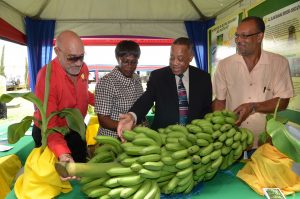 Bananas are found in every grocery store as cheap, affordable produce, but the fruit represents more than just something we eat and enjoy. It is symbolic of the many economic, social, environmental and political problems where the cheap price-per-pound label on the banana comes at the cost of the lives of workers in the banana industry in order to keep the market price low for consumers in wealthier nations. I want to focus on the second aspect of my food solution because that is where I gained the most insight. The challenge presents itself when trying to limit the reach of big transnational corporation in the banana industry to prevent the formation of monopolies. Current global fair trade regulations are not designed to take into account thing such as working/living wages, market prices, and efforts gone towards promoting high environmental standards, so “an organic fair trade certified banana is treated exactly the same as a banana from a plantation where labor standards are violated and workers’ health and their environment are damaged” (Fairtrade Foundation, 14). To balance the inequalities, I proposed a multi-tier system of reward incentives integrated into fair trade deals to help level the playing field between small farmers and powerful private corporations. Small farmers that practice sustainable agricultural methods such as vertical farming and regenerative agriculture will be given subsidies that matches or exceeds the average livable wage that will directly benefit them.
Bananas are found in every grocery store as cheap, affordable produce, but the fruit represents more than just something we eat and enjoy. It is symbolic of the many economic, social, environmental and political problems where the cheap price-per-pound label on the banana comes at the cost of the lives of workers in the banana industry in order to keep the market price low for consumers in wealthier nations. I want to focus on the second aspect of my food solution because that is where I gained the most insight. The challenge presents itself when trying to limit the reach of big transnational corporation in the banana industry to prevent the formation of monopolies. Current global fair trade regulations are not designed to take into account thing such as working/living wages, market prices, and efforts gone towards promoting high environmental standards, so “an organic fair trade certified banana is treated exactly the same as a banana from a plantation where labor standards are violated and workers’ health and their environment are damaged” (Fairtrade Foundation, 14). To balance the inequalities, I proposed a multi-tier system of reward incentives integrated into fair trade deals to help level the playing field between small farmers and powerful private corporations. Small farmers that practice sustainable agricultural methods such as vertical farming and regenerative agriculture will be given subsidies that matches or exceeds the average livable wage that will directly benefit them.
I developed a similar reward system to be used with big corporations where reduce trade tariffs and tax cuts are used as incentives for transnational banana companies that use sustainable methods of agriculture, ethical business practices, and assist with the transition to sustainable farming. While it is very possible to punish big corporations for unethical labor practices happening now, they have the financial capital, infrastructure, and knowledge of the banana trade and it would therefore make sense to keep them in play so that they can help small farmers make the shift towards sustainable agriculture. Developing a reward system for already powerful and greedy corporations went against my own intuition of wanting to bring them to justice and minimize their power. But I learned that sometimes difficult decisions aren’t so clear-cut and often times decisions need to examined from a holistic perspective of a system and made for the greater good.
Fairtrade Foundation. “Unpeeling the Banana Trade.” (2009): 1-22. Print
